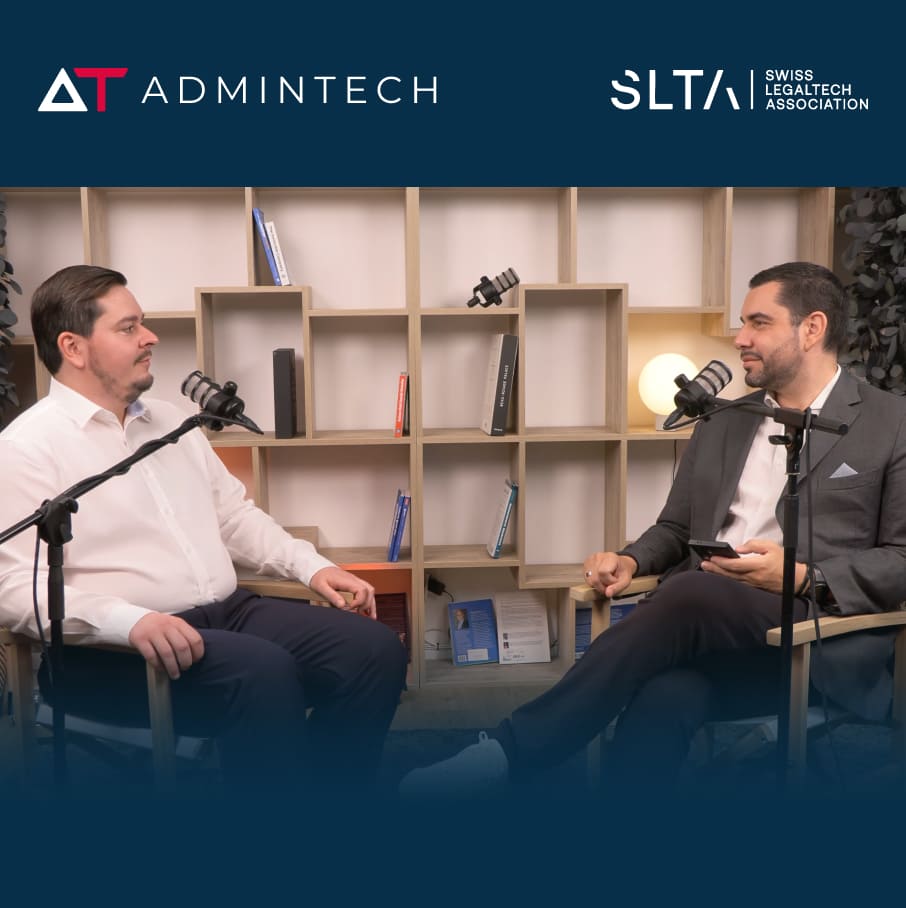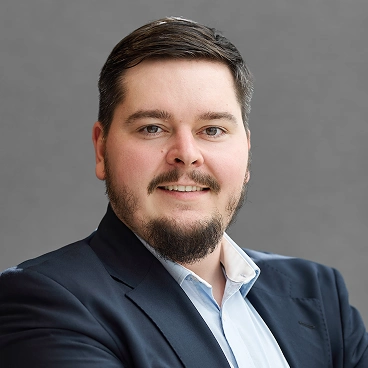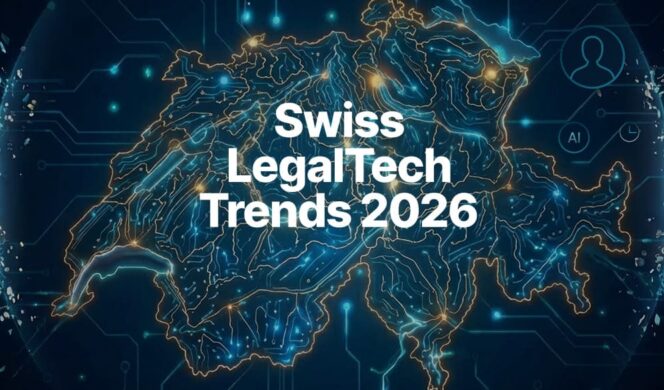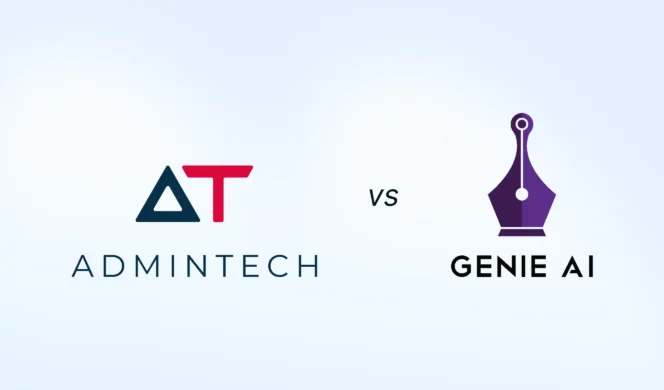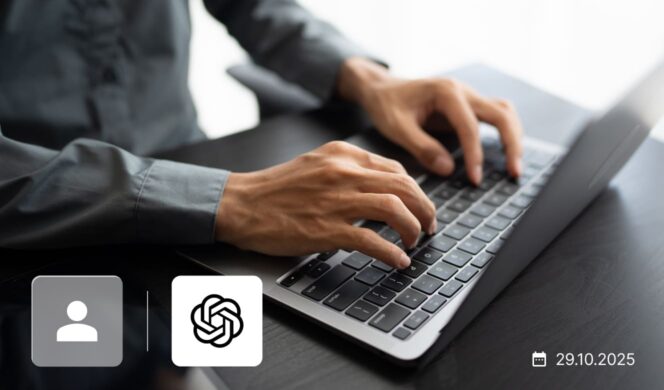Swiss LegalTech Talk with Andriy Chubatyuk
Technology is changing how legal processes are managed. At AdminTech, we’re at the forefront of this evolution — combining the expertise of legal and tech specialists to help Swiss businesses, fiduciaries, and legal teams handle routine tasks more efficiently.
In a recent interview with the Swiss LegalTech Association, our Founder and CEO, Andriy Chubatyuk, shared his journey from being a tax lawyer to founding the legal tech startup AdminTech, insights on upcoming innovations and trends that will shape the legal landscape.
Watch: Andriy Chubatyuk in Conversation with the Swiss LegalTech Association
Introduction & Background
Nicolas: Hello, everybody. Welcome to this SLTA talk. We are here today with Andriy Chubatyuk. He is the CEO and founder of AdminTech, and he’s here to talk to us about his company, about the market, his personal experience, and share some insights. Hello, Andriy, good to meet you.
Andriy: Hi, Nicolas, good to meet you. Thank you for the invitation.
From Law to Legal Tech
Nicolas: So, you’ve created AdminTech, a legal tech startup in Switzerland. Could you tell us a bit about the company and what you do?
Andriy: Yes, AdminTech started as a technology company with a specific focus on helping businesses with their day-to-day routine, paperwork, and legal questions. Legal tech is part of what we do, and it is what we focus on now.
Nicolas: Excellent, thank you very much. You have an impressive journey. You have a Master of Law, experience as a tax lawyer, and you’ve even authored a book about Swiss tax law. What inspired you to switch to legal tech and create a startup?
Andriy: As a former lawyer, you can relate: everybody who went to law school wants to help people. As a specialist, you can help a lot of people, but you only have 24 hours a day. If you really want to make a big impact on the world, you need to lead a team of specialists and become a visionary. Also, my father is an entrepreneur, and my brother is a businessman. It was a natural course for me to use my expertise to share it, train my employees, build a team, and have a greater impact for the better of the world because nobody can change the world alone.
Bridging the Market Gap and Improving User Experience
Nicolas: That’s a very good point. I read that before founding AdminTech, you worked in companies of all sizes. You noticed that small businesses lacked the legal input they might need and had a “lightbulb moment.” Could you share more about that?
Andriy: My company was founded in 2021, the early post-Covid era, which was the “lightbulb moment.” I realized there was a very big gap in how people understood the impacts of Covid. Small and medium businesses saw it as a revolution in how they do business. Unfortunately, most consulting and legal companies saw it as a temporary discomfort and were happy to go back to their traditional ways. This created a gap between demand and supply, and I saw a market opportunity to bridge this gap.
Nicolas: That’s a very interesting point. You’re touching upon one of the law’s biggest problems: user experience. Your platform tackles this by showing in real-time what happens when a user makes a change. Was this a conscious user experience reflection? How did you come to this type of interface?
Andriy: I think businesses like to stay in control, especially entrepreneurs. They want to see the result of their work immediately. Real-time text editing—where clauses change based on the choices and information you provide—gives instant feedback for the business owner, who can check if they like it or want to change it. This is a much better experience than waiting a week for a response from a lawyer.
Development and AI Roadmap
Nicolas: That’s a fair point. So, you started your platform with a builder and contract templates. What’s on the development roadmap? Are you thinking about more integrations or features? What does it look like?
Andriy: I’ll give you a teaser. This September, we’re launching our new AI agent, which will absolutely revolutionize how people create agreements. You will have a conversation like you would with a lawyer, and it will pinpoint errors, guide you, and proactively offer solutions. Based on this, you’ll get your legal document. This is supposed to revolutionize the experience because it’s going to be a more human and fluid interaction. We’re launching this in two to three weeks, but we’re also working on a lot of AI development to improve our services. You’ll hear more about this in the upcoming months.
Nicolas: As of the recording of this interview, ChatGPT-5 just became available. I have to ask, what kind of AI are you using? Is it something you can share?
Andriy: I can’t tell you exactly what AI we’re using, but I can say we use various language models at the same time. Our system is built on a multi-agent approach, which is crucial because it gives us flexibility. Like you said, if a new LLM comes out and is more powerful or better for a specific task, we can switch to it while leaving other language models for other tasks. We are not dependent on a single provider, which allows us to scale and be flexible at the same time.
Balancing Risk as Lawyer and CEO
Nicolas: Okay, I get it. That makes a lot of sense. From your personal perspective, you wear two hats: a lawyer and a startup CEO. These are generally two very different risk profiles. The lawyers I know handle problems through risk management and tend to say no to risk. CEOs, on the other hand, tend to be very risk-tolerant and often say, “I’ll take it.” How do you balance these two risk profiles?
Andriy: While being a lawyer is my experience and profession, I am a CEO and a businessman. I don’t think anyone can achieve anything good in life without taking risks. The important thing is that risks must be anticipated and prepared for. All my decisions, no matter how bold, are based on data, analytics, and the experience and expertise of my team, whom I trust and consult. So, I do take risks, but they are calculated.
Reliability Compared to Traditional Legal Services
Nicolas: That is a very good position. I’m always in favor of data-based decision-making rather than “gut feeling” decisions. You can do that, but if you have data, you should use it. Okay, going more into the core of the project. You mentioned the downsides of using traditional legal services. My general view is that it depends on the situation whether you use online software or a lawyer. What kind of reliability is necessary for your services compared to a traditional lawyer? Why is it better for the risks you address to go to an online service or a traditional lawyer?
Andriy: I see a big difference between high-level expertise services and medium and low-cost services. Of course, if you want to make a “deal of the century,” you will have many questions and need to consult a lawyer. But generally, when a small or medium business contacts a law firm for an agreement, the firm fills out a template. These templates are established by human lawyers beforehand. We just use technology to change the process. The expertise is there, but our technology allows it to be delivered differently. In terms of reliability, statistically, one-third of claims against law firms for misconduct are due to poor proofing of documents. Our system makes a hundred times fewer errors than that. Therefore, for this specific task, we are better than the general legal service you could expect.
Nicolas: Do you think there’s more tolerance if you’re buying an online service versus a traditional legal service? Maybe you’ll accept an error more easily.
Andriy: No, not necessarily. People don’t want errors, but they have a sense of trust. Once they trust your platform, it’s the same as when they trust a lawyer they’ve worked with for ages. What’s important for them is the immediate experience. Businesses don’t necessarily see an error in their agreement until maybe five years later when they end up in court and lose. But what they do see immediately are non-transparent prices, missed deadlines, and unclear responses. This is a big differentiator for the business.
Designed for Businesses that Can’t Wait
Nicolas: Who is your typical client? What do they look like, and who are your services intended for?
Andriy: Our first project, the smart templates, is intended for small and medium businesses. I wouldn’t say it depends on the size but rather the pace of the business. We see that a lot of our clients make agreements on weekends, late at night, and they need them urgently. So, our client base consists of businesses for whom time is of the essence. In a digital world, waiting a couple of days to sign a deal you just negotiated is absurd.
Response from the Legal Community
Nicolas: I can empathize with that. What kind of response did you get from the legal community? Did you face any headwinds, or did you get support? My experience is that it’s very variable.
Andriy: I agree. I’ll put it this way: there will always be people who say the best way to take a photograph is to use a black-and-white film camera, and that’s not a bad thing. Then there are those who will go for digital cameras and move into the future. I just decided to be on the second side of the gap.
Education and Democratisation of Legal Services
Nicolas: You’ve also been active in education, writing a book and articles. How is that important to you, and how does it tie into AdminTech’s goals?
Andriy: There are two reasons for that. As Richard Feynman said, if you want to master something, you have to teach it. I think a lot of lawyers write articles and books for that purpose. Another thing is that it aligns with my core vision of democratizing legal services. Whether it’s by publishing books, writing articles, blogging on LinkedIn, or creating a SaaS that helps businesses acquire legal services at a better and more transparent price, all of this is part of the same vision to make legal services and knowledge more available.
Pricing Transparency and Industry Trends
Nicolas: When you say a “more transparent price,” I have a feeling that in recent years, lawyers have updated their business models. Many are willing to give you different pricing methods. I think they’re also addressing the transparency issue. Have you experienced that?
Andriy: Yes, because the trend is there. Many of them understand that the demands of businesses have changed. Look at it this way: you can get an instant subscription to Netflix or lease a laptop for your business right now. For a business, especially a growing one, they want to know what costs they can anticipate and how to calculate their budget. Paying a retainer and then expecting a bill based on an hourly rate—whether it’s 5,000 or 50,000—is just unacceptable. So, they are forced to change their business model. In ten years, everyone will switch to this model. The “clandestine timesheets” will be a thing of the past.
Nicolas: “Clandestine timesheets.” To be honest, I’ve seen some data that suggests when a lawyer can tell a client, “In our experience, cases like yours take eight months, cost between 10,000 and 12,000, and we’ve won seven out of ten cases,” they are more likely to sign a deal, even if it’s more expensive. Data is what you were talking about.
Andriy: Yes, data-based decisions. When you’re an entrepreneur, it’s still a decision whether to go to court or settle. When they say, “You have a 70% chance of winning, the legal costs will be this, and the time and energy will be that,” you make the calculations and decide which risks you’re going to take. This is the first part of legal counseling that a law firm should provide: to give you the perspective of what to expect.
Partnerships and Collaboration
Nicolas: Makes sense. You mentioned the importance of not changing the world alone. Have you built partnerships with other companies? How do you view collaboration for AdminTech?
Andriy: First, AdminTech is part of the Business Innovation Group, an accelerator for IT startups. I was also a former director at a fiduciary company in LedgerPeek, which I helped create as a “fiduciary of the future”—purely paperless before it was mainstream. AdminTech is my second project. The important thing is that we have developed many partnerships with tech companies throughout my journey. We are now expanding our focus because there’s a gap we need to bridge between businesses and law firms. We have a solid foundation on the business side of the market and are now venturing more into enterprise-grade solutions for law firms. If I can provide a good service with my know-how, why wouldn’t I help other law firms do the same? We’re looking at a lot of strategic partnerships. We launched the product on the market last summer and have been testing the SMB market, getting valuable insights and data. Our next stage is to go into the enterprise level and build lasting strategic partnerships in Switzerland and neighboring countries.
Challenges of Starting a Legal Tech Startup
Nicolas: Okay. Switching to the environment for startups in Switzerland, what do you think are the biggest challenges if you want to start a legal tech company? What challenges did you face, and how did you overcome them?
Andriy: There are a lot of challenges. Number one is finding the right team. My team wasn’t formed immediately; people came and went. Sometimes you have two amazing specialists, but they won’t work together. So, team building is the number one priority. Networking is complicated. The multilingual environment, whether you’re in Geneva or Zurich, and whether you speak German, are all points to consider. In the end, it’s all about the people. Switzerland is a small country, we don’t have 350 million people like the U.S. where you can find all sorts of specialists. So, you have to cherry-pick, and it takes a bit more time, but it’s doable.
Funding, Resources, and Policy
Nicolas: And in terms of available resources for financing, potential tax incentives, or infrastructure? What was your feeling about that?
Andriy: For now, we are self-funded pre-seed. In terms of incentives, I think Switzerland is more conservative in investing in legal tech and future technologies. I wouldn’t even go there with taxes; I would say the government doesn’t really care about innovation at all. That is my take. This is a challenge, of course, but challenges have to be overcome.
AI Regulation and Government Recommendations
Nicolas: If you were to tell the government as a CEO and founder, “This is what would really help us build more startups and continue supporting Switzerland’s position as an innovating country,” what would be the number one thing you would suggest?
Andriy: I recently published an article about that. I said for Switzerland to prosper, we need to make the rules for AI development as flexible as possible to attract all sorts of talent. We need to become the number one data hub in Europe without compromising our principles of confidentiality and data protection, but still democratizing the approach to new technologies. If it takes two to three years to make a reform to make something available, it’s too late.
Adapting to Fast-Changing Technology
Nicolas: Innovation is happening extremely quickly. How do you make any strategic planning if a completely revolutionary model comes out every six months?
Andriy: Fortunately, when revolutionary models come out, they are available on the market for free. You just have to keep track of it and be aware of what you need to anticipate. I have specialists on my team for that, and you stay up-to-date. As I already said, since we are flexible with the models we use, we can switch anytime, which gives us more leeway and a better possibility to adapt.
Customer Acquisition and Market Fit
Nicolas: What were the biggest challenges in getting your first customers in Switzerland?
Andriy: There were no challenges. Of course, you need to put effort into marketing, sales, and UX, but we didn’t come out with our project “out of the blue.” We saw that the market needed it; there was demand, and we were certain about it. When we launched our project, we saw that people adopted it quickly. Essentially, we didn’t need to convince anyone; we just gave people what they already wanted.
Swiss Legal Tech Ecosystem
Nicolas: I mean, this is a question we have an interest in at the Swiss LegalTech Association. How do you find the Swiss legal tech ecosystem?
Andriy: As a whole, it’s obviously a bit behind the UK and definitely behind the US. It’s much better than our neighbors like France, Germany, and Italy. But I think there are two problems that still need to be addressed. The first problem is too much focus on big companies and not enough focus on providing affordable services for small and medium businesses, which are the backbone of our economy and 90% of our GDP. That is a sad point. Second, there are not many solutions readily available for non-lawyers. There are a lot of tools for law firms, and I would like the legal tech ecosystem to provide more services than just tools, because that’s what we did with our first project. We used tools, but we provided a service.
Future Trends in Legal Tech
Nicolas: Thank you very much for those answers. Now, I’d like to switch to the question of what the future looks like. What trends are you observing in the legal market in Switzerland?
Andriy: On the legal market, I’m observing more adoption of digitalization and new technologies, obviously. Some law firms are finally using at least cloud sharing and storage and all sorts of tools to streamline their work. So, the trend is going there, albeit a bit too slowly. I do see a democratization of prices and pricing policies becoming more transparent. I see that law firms fear the impact of new technologies, or more specifically, they fear other law firms that will adopt them faster. Many law firms are waking up and understanding that there is a race and they need to keep up their pace. I think we will see more and more development of technologies for lawyers and for businesses. I am certain that this market will develop very fast, and the speed will grow exponentially, just as new technologies and LLMs are being developed more and more and exponentially faster.
Technology vs. Lawyer Priorities
Nicolas: The exponential factor is a bit concerning for the legal profession, isn’t it? As a lawyer, the top priorities are meeting deadlines, client acquisition, and due diligence—making sure you’re always on top of your game and not missing an argument. Anything related to technology generally comes after those three priorities.
Andriy: I would disagree. Technologies will help you achieve these priorities better. They will help you spend less time on repetitive tasks and help you check, draft, and analyze your data better. Technologies will help you. I don’t see why an accountant would refuse to use Microsoft Excel or why a mathematician would refuse to use a calculator. In the same way, I don’t see why some lawyers still refuse to use technologies.
Nicolas: I don’t think it’s about refusal; at least in my experience, it’s that the priority list causes them to look at technology only after they’ve dealt with all the other priorities. When I was selling software, the issue I faced was that meetings would get canceled at the last minute due to a deadline. That is the reality. If you want to look at technology, you need to allocate time for that, no?
Andriy: It’s about the business process and internal structure of the firm. I think we’re confusing operational and business development parts here. Of course, you have operational priorities. Yes, you have a deadline, and it’s urgent, and you need to save your client, go to court, or write a brief. Of course, you cannot put it off because deadlines are legal, and there’s nothing you can do about it. But at the same time, there are business development priorities: adopting new technologies and training your juniors on how to use them properly because we know they do use them. If you are too focused on operations and cannot deal with the business development part, hire someone.
Smaller Law Firms and Tech Adoption
Nicolas: That is a very good point. You should have somebody whose job it is to take care of those matters. But how do smaller law firms do it in your view? Did you ever see anyone have a good solution to that problem?
Andriy: Smaller law firms have a bigger chance of adopting technologies faster because they are not bound by rigorous corporate policies. They can make decisions faster. If they need to change their technology, their office, or the way they do business, they can do it in a matter of days or weeks, whereas it would take a big law firm months or years. So, their budget is smaller, but their pace is faster.
Lawyer Replacement vs. Empowerment
Nicolas: How do you view the traditional dilemma of technology replacing lawyers versus lawyers needing to empower themselves with technologies? Where do you stand on this issue of replacement?
Andriy: It’s not about replacement. I don’t really understand the skepticism. I think the fear comes from a lack of understanding, as they say, “We’re not afraid of the dark but of what we don’t see in the dark.” So, those who are afraid of being replaced should start learning about it, reading about it, and playing with it. Or, again, hire somebody who can do this for you. The more you understand the new technology, the less you will fear it. We’ve been through this in history; there was always a point where we had a new technology, there were always skeptics, and the adoption of new trends takes time.
AdminTech’s Long-Term Vision
Nicolas: That’s true. Where do you see AdminTech in the next few years? This seems to be a very difficult question because the landscape is evolving so quickly. What’s your best guess?
Andriy: It is evolving quickly, but without getting into too many details, the eventual end goal is an automated service that takes care of all your legal questions, not only reactively but also proactively. It should be an app you can ask a question, and it does everything for you. It should also proactively remind you, “Don’t forget this deadline; you need this document; here you go.” It should leave only the high-level, complex expertise tasks for human lawyers. The rest—90%—should be automated.
Nicolas: 90%? That’s a lot.
Andriy: It is.
Nicolas: I mean, strategic thinking time should take a lot of time, no? However, you can definitely improve that if you work with new tools.
Andriy: Yes, of course. But as I said, it’s a vision for the future. I’m not saying it’s going to come in one or two years. It’s like when you want to sell spaceships, you talk about the end goal of colonizing Mars. For me, this is the “colonizing Mars” part. There are still a lot of things we need to do to get there, and each milestone will still have a big impact on how the legal industry works.
Nicolas: That makes sense. At least I hope we don’t blow up 50 spaceships in the process of going to Mars.
Andriy: Some spaceships need to be blown up. I’m more for constant improvement being better than delayed perfection.
Nicolas: That makes sense. And that’s a very entrepreneurial mindset, right? You just have to start, even though there are risks and things will go wrong. If you’re starting, you’re confronting your ideas with the market and getting feedback, so you can improve them.
Andriy: Yes, of course. There’s always something in life that we’ve learned for the first time. We’ve learned to talk, walk, etc. Nobody has ever said, “You shouldn’t try it; you’ve never done this before.”
Closing Remarks
Nicolas: Yeah, makes sense. All right, this concludes our discussion for today. Thank you very much, Andriy, for being with us. We were with Andriy Chubatyuk of AdminTech. We hope to see you in a future video of our SLTA talks, and we thank you for your attention. You can see our website at swisslegaltech.ch, subscribe to our YouTube channel, Swiss Legal Tech, if you like this kind of content. We hope to see you soon.
Andriy : Thank you, Nicolas.
Andriy envisions a future where an automated service handles 90% of all legal questions — but the journey toward that goal has already begun. It starts with rejecting bureaucratic bottlenecks and ‘absurd’ delays. It starts with embracing technology that streamlines routine tasks, provides instant clarity, and allows businesses, lawyers, and fiduciaries to focus on what truly matters — strategy, growth, and impact.
